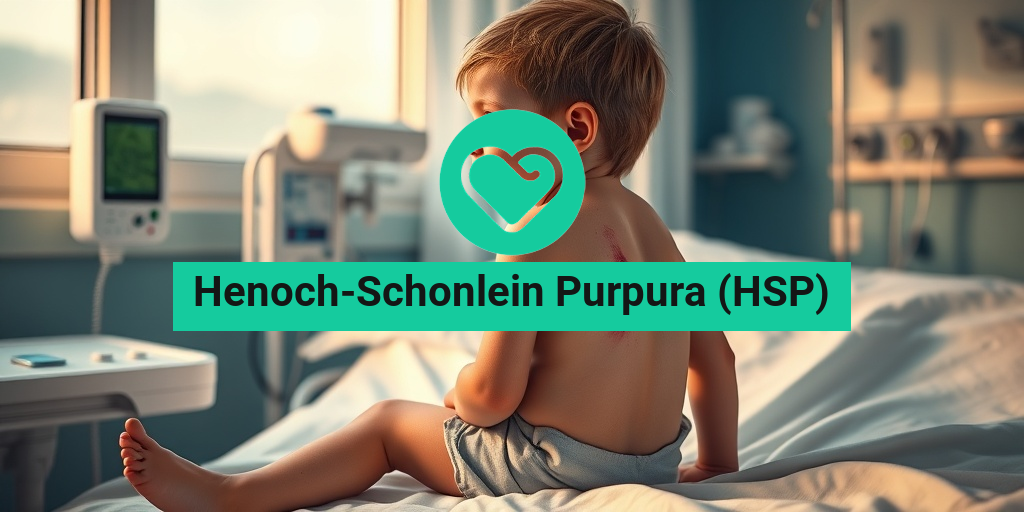What Is Henoch-Schonlein Purpura?
Henoch-Schonlein Purpura (HSP) is a form of small-vessel vasculitis, primarily affecting children but can also occur in adults. This condition is characterized by inflammation of the blood vessels, leading to a range of symptoms that can be both alarming and confusing for parents and patients alike. HSP is often triggered by infections, particularly respiratory infections, and is associated with the deposition of immune complexes in the blood vessels.
The hallmark of HSP is the distinctive rash that appears on the skin, typically on the buttocks, legs, and sometimes the arms. This rash is caused by bleeding under the skin, resulting in purplish spots known as purpura. While the exact cause of HSP remains unclear, it is believed to be related to an abnormal immune response.
Understanding the Causes of HSP
While the precise cause of Henoch-Schonlein Purpura is not fully understood, several factors may contribute to its development:
- Infections: Many cases of HSP follow a viral or bacterial infection, particularly upper respiratory infections.
- Genetic Factors: Some individuals may have a genetic predisposition that makes them more susceptible to developing HSP.
- Environmental Triggers: Certain environmental factors, such as exposure to allergens or medications, may also play a role.
Understanding these potential triggers can help in managing and preventing future episodes of HSP.
HSP Symptoms
The symptoms of Henoch-Schonlein Purpura can vary from person to person, but they typically include:
1. Skin Rash
The most recognizable symptom of HSP is the purpuric rash, which appears as raised, red or purple spots on the skin. This rash often starts on the buttocks and legs and can spread to other areas. It may be itchy or painful, but it usually resolves on its own within a few weeks.
2. Joint Pain and Swelling
Many children with HSP experience joint pain and swelling, particularly in the knees and ankles. This symptom can be quite debilitating, making it difficult for children to engage in normal activities.
3. Abdominal Pain
Abdominal pain is another common symptom of HSP, often presenting as cramping or colicky pain. This can be accompanied by nausea or vomiting, and in some cases, it may lead to gastrointestinal bleeding.
4. Kidney Involvement
In some cases, HSP can affect the kidneys, leading to a condition known as Henoch-Schonlein Purpura Nephritis. Symptoms may include blood in the urine, proteinuria (excess protein in the urine), and swelling due to fluid retention. Regular monitoring of kidney function is essential for those diagnosed with HSP.
5. Other Symptoms
Other less common symptoms may include:
- Fatigue: Many children may feel unusually tired or lethargic.
- Fever: A mild fever can accompany the onset of HSP.
If you notice any of these symptoms in your child, it is crucial to consult a healthcare professional for an accurate diagnosis and appropriate management. Early intervention can help mitigate complications associated with HSP.
For more detailed information and resources on Henoch-Schonlein Purpura, consider visiting Yesil Health AI, where you can find evidence-based health answers tailored to your needs.
In conclusion, while Henoch-Schonlein Purpura can be concerning, most children recover fully with proper care and monitoring. Understanding the symptoms and seeking timely medical advice can make a significant difference in managing this condition. 🌟

HSP Causes and Risk Factors
Henoch-Schonlein Purpura (HSP) is a small-vessel vasculitis that primarily affects children, although it can occur in adults as well. Understanding the causes and risk factors associated with HSP is crucial for early detection and management.
What Causes HSP?
The exact cause of HSP remains unclear, but it is often preceded by an upper respiratory infection, such as a cold or flu. This suggests that the body’s immune response to infections may trigger the condition. Some potential causes include:
- Infections: Viral infections, particularly those caused by adenoviruses, parvovirus B19, and certain bacteria, have been linked to HSP.
- Medications: Certain medications, including antibiotics and non-steroidal anti-inflammatory drugs (NSAIDs), may trigger HSP in susceptible individuals.
- Allergic Reactions: Allergies to foods or environmental factors can also play a role in the onset of HSP.
Risk Factors for HSP
While HSP can affect anyone, certain factors may increase the likelihood of developing this condition:
- Age: HSP is most common in children aged 2 to 6 years, although it can occur at any age.
- Gender: Boys are more frequently affected than girls, with a ratio of approximately 2:1.
- Family History: A family history of HSP or other autoimmune diseases may increase the risk.
- Seasonal Factors: HSP is more prevalent in the fall and winter months, possibly due to the increased incidence of respiratory infections during these seasons.
Recognizing these causes and risk factors can help parents and caregivers be vigilant for symptoms of HSP, leading to timely medical intervention. 🌟
HSP Diagnosis
Diagnosing Henoch-Schonlein Purpura (HSP) involves a combination of clinical evaluation and laboratory tests. Early diagnosis is essential for effective management and to rule out other conditions that may present similarly.
Clinical Evaluation
The diagnosis of HSP typically begins with a thorough clinical evaluation. Healthcare providers will look for the classic symptoms, which include:
- Purpura: The hallmark of HSP is a distinctive rash characterized by raised, purple spots, usually found on the buttocks, legs, and sometimes the arms.
- Joint Pain: Many children experience joint pain or swelling, particularly in the knees and ankles.
- Abdominal Pain: Some patients may report abdominal pain, which can be severe and may be accompanied by gastrointestinal bleeding.
- Kidney Involvement: Symptoms such as blood in the urine or proteinuria may indicate kidney involvement, which is a serious complication of HSP.
Laboratory Tests
While there is no single test to confirm HSP, several laboratory tests can support the diagnosis:
- Blood Tests: These tests can help assess kidney function and detect inflammation in the body.
- Urinalysis: A urinalysis can reveal the presence of blood or protein in the urine, indicating kidney involvement.
- Skin Biopsy: In some cases, a skin biopsy may be performed to confirm the diagnosis by examining the blood vessels in the skin.
It’s important for parents to communicate any recent infections or symptoms their child has experienced, as this information can aid in the diagnostic process. Early recognition and diagnosis of HSP can lead to better outcomes and management strategies. 🩺

HSP Treatment Options
Henoch-Schönlein Purpura (HSP) is a form of small-vessel vasculitis that primarily affects children, although it can occur in adults as well. The treatment for HSP largely depends on the severity of the symptoms and the specific complications that may arise. Here, we will explore the various treatment options available for managing HSP effectively.
1. Observation and Supportive Care
In many cases, especially when symptoms are mild, observation and supportive care are sufficient. This approach includes:
- Hydration: Ensuring adequate fluid intake to prevent dehydration.
- Rest: Encouraging plenty of rest to help the body recover.
- Pain Management: Over-the-counter pain relievers like acetaminophen or ibuprofen can help alleviate discomfort.
Most children with mild HSP recover without any specific treatment, and regular follow-ups with a healthcare provider are recommended to monitor their progress.
2. Medications
For more severe cases or when complications arise, medications may be necessary. Commonly prescribed medications include:
- Corticosteroids: Drugs like prednisone can help reduce inflammation and manage symptoms, especially if there is significant abdominal pain or kidney involvement.
- Immunosuppressants: In cases where corticosteroids are ineffective, medications such as azathioprine or mycophenolate mofetil may be used to suppress the immune response.
It’s essential to work closely with a healthcare provider to determine the most appropriate medication and dosage for each individual case.
3. Treatment for Complications
HSP can lead to various complications, such as kidney involvement (HSP nephritis) or gastrointestinal issues. Treatment for these complications may include:
- Kidney Monitoring: Regular urine tests and blood tests to monitor kidney function.
- Dialysis: In severe cases of kidney failure, dialysis may be necessary.
- Specialized Care: Referral to a nephrologist for children with significant kidney involvement.
Early detection and management of complications are crucial for a better prognosis.
HSP Complications
While many children recover from Henoch-Schönlein Purpura without long-term effects, some may experience complications that require careful management. Understanding these potential complications can help parents and caregivers be vigilant and proactive in seeking medical attention.
1. Kidney Involvement (HSP Nephritis)
One of the most concerning complications of HSP is kidney involvement, which can manifest as:
- Hematuria: Blood in the urine, which may be visible or detected through testing.
- Proteinuria: Excess protein in the urine, indicating kidney damage.
- High Blood Pressure: Elevated blood pressure can occur due to kidney impairment.
Regular monitoring of kidney function is essential, as early intervention can prevent long-term damage.
2. Gastrointestinal Complications
HSP can also lead to gastrointestinal issues, including:
- Abdominal Pain: Severe abdominal pain can occur due to inflammation of the blood vessels in the intestines.
- Intussusception: A rare but serious condition where part of the intestine folds into itself, potentially requiring surgical intervention.
Parents should be aware of any significant changes in their child’s abdominal symptoms and seek medical advice promptly.
3. Skin Manifestations
The characteristic purpura (purple spots) associated with HSP can sometimes lead to:
- Skin Ulcers: In rare cases, the skin lesions may become ulcerated.
- Scarring: Some children may experience scarring from the purpura.
While these skin complications are generally not serious, they can be distressing for children and parents alike.
4. Joint Pain
Joint pain and swelling are common symptoms of HSP, and while they usually resolve on their own, some children may experience:
- Chronic Joint Pain: Persistent pain that may require physical therapy or pain management strategies.
Monitoring and addressing joint symptoms can help improve the child’s quality of life.
In conclusion, while Henoch-Schönlein Purpura can lead to various complications, early recognition and appropriate treatment can significantly improve outcomes. Always consult with a healthcare provider for personalized advice and management strategies tailored to your child’s needs. 🩺

HSP in Children
Henoch-Schönlein Purpura (HSP) is a condition that primarily affects children, often leading to a range of symptoms that can be concerning for both kids and their parents. Understanding HSP is crucial for early recognition and effective management.
What is Henoch-Schönlein Purpura (HSP)?
HSP is a small-vessel vasculitis, which means it involves inflammation of the small blood vessels. This condition is characterized by a distinctive rash, typically presenting as purpura—small, purple spots on the skin that do not blanch when pressed. The rash usually appears on the buttocks, legs, and sometimes the arms.
Symptoms of HSP in Children
Recognizing the symptoms of HSP is essential for timely intervention. Common symptoms include:
- Purpura: The hallmark of HSP, these spots can vary in size and are often accompanied by swelling.
- Joint Pain: Many children experience pain and swelling in their joints, particularly in the knees and ankles.
- Abdominal Pain: Some children may have severe abdominal pain, which can be mistaken for other gastrointestinal issues.
- Kidney Involvement: In some cases, HSP can lead to nephritis, causing symptoms like blood in the urine or swelling due to fluid retention.
It’s important to note that while HSP can be alarming, most children recover fully without long-term complications. However, monitoring for kidney involvement is crucial, as it can lead to more serious issues if left untreated.
Causes and Triggers of HSP
The exact cause of HSP remains unclear, but it often follows a respiratory infection, such as a cold or flu. Other potential triggers include:
- Infections (especially viral)
- Medications
- Food allergies
Understanding these triggers can help parents manage their child’s health and reduce the risk of flare-ups.
HSP Management and Care
Managing Henoch-Schönlein Purpura (HSP) involves a combination of monitoring symptoms and providing supportive care. Here are some key strategies for effective management:
Medical Treatment Options
While many cases of HSP resolve on their own, some children may require medical intervention. Treatment options can include:
- Pain Relief: Over-the-counter pain relievers like acetaminophen or ibuprofen can help alleviate joint pain and discomfort.
- Corticosteroids: In more severe cases, doctors may prescribe corticosteroids to reduce inflammation and manage symptoms.
- Monitoring Kidney Function: Regular check-ups may be necessary to monitor kidney health, especially if there are signs of nephritis.
Home Care Strategies
In addition to medical treatment, parents can take several steps at home to support their child’s recovery:
- Rest: Encourage your child to rest and avoid strenuous activities, especially if they are experiencing joint pain.
- Hydration: Ensure your child stays well-hydrated, as this can help support kidney function.
- Healthy Diet: A balanced diet rich in fruits, vegetables, and whole grains can support overall health and recovery.
When to Seek Medical Attention
While most cases of HSP are mild, it’s essential to know when to seek medical help. Parents should contact a healthcare provider if:
- The rash spreads or worsens significantly.
- Your child experiences severe abdominal pain or swelling.
- There are signs of kidney involvement, such as blood in the urine or significant swelling.
By staying informed and vigilant, parents can help manage Henoch-Schönlein Purpura effectively, ensuring their child receives the care they need for a full recovery. 🌈

Frequently Asked Questions about Henoch-Schonlein Purpura (HSP)
What is Henoch-Schonlein Purpura (HSP)?
Henoch-Schonlein Purpura (HSP) is a type of small-vessel vasculitis that primarily affects children. It is characterized by a distinctive rash, joint pain, abdominal pain, and kidney involvement. The condition is believed to be triggered by infections or other environmental factors.
What are the common symptoms of HSP?
- Rash: A purplish rash typically appears on the buttocks, legs, and sometimes the arms.
- Joint Pain: Swelling and pain in the joints, particularly in the knees and ankles.
- Abdominal Pain: Cramping and discomfort in the stomach area.
- Kidney Issues: Symptoms may include blood in the urine or swelling due to fluid retention.
How is Henoch-Schonlein Purpura diagnosed?
Diagnosis of HSP is primarily based on clinical symptoms and physical examination. Doctors may also perform blood tests and urinalysis to assess kidney function and rule out other conditions.
What treatments are available for HSP?
Most cases of Henoch-Schonlein Purpura resolve on their own without treatment. However, supportive care may include:
- Pain Relief: Over-the-counter medications like ibuprofen or acetaminophen for joint pain.
- Hydration: Ensuring adequate fluid intake to prevent dehydration.
- Monitoring: Regular check-ups to monitor kidney function and overall health.
Can HSP affect adults?
While Henoch-Schonlein Purpura is more common in children, adults can also develop the condition. Symptoms and treatment are generally similar, but adults may experience more severe complications.
Is there a risk of complications from HSP?
In most cases, HSP is self-limiting, but complications can occur, particularly involving the kidneys. It is essential to monitor kidney function and seek medical attention if symptoms worsen.
How can I help my child cope with HSP?
Supporting your child through HSP involves:
- Emotional Support: Reassure them that the condition is usually temporary.
- Comfort Measures: Provide pain relief and comfort during flare-ups.
- Education: Teach them about the condition to help them understand what they are experiencing.
Where can I find more information about HSP?
For more detailed information, consult healthcare professionals or visit reputable medical websites. Organizations dedicated to children’s health may also provide valuable resources.




